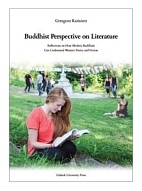Buddhist Perspective on Literature
Reflection on How Modern Buddhists Can Understand Western Poetry and Fiction
The essence of Buddhism is compassion, or rather tapping into the unlimited resources
of mind's inner wealth, the full development of human potential. Art and
literature are also often understood as tools for bringing deep meaning to human
existence, enriching it with qualities and values more profound than mindless consumption.
Can these two unlikely friends, Buddhism and literature, form an effective ally in
bringing timeless dimensions to our everyday lives?
Foreword by Lama Ole Nydahl 9
Introduction . 11
Western Literary Th eory and Buddhism 11
Introduction to Contemporary Literary Studies 13
Introduction to Buddhist Dharma . 19
Summary of Chapters . 26
Acknowledgment 30
Chapter 1
A Historical Overview of Buddhism in the Western Narrative 31
1.1. Introduction 31
1.2. Ancient Encounters . 31
1.3. Aesop’s Tales of Buddha’s Rebirths . 36
1.4. Philosophical Affi nity: Pyrrho and Nagarjuna . 38
1.5. Paralells and Infl uence on Early Christian Spiritual Literature 40
1.6. Buddhadharma in the Gospels 43
1.7. Christian Missionarries. 47
1.8. Buddha as a Christian Saint: the Story of Josaphat and Barlam . 49
1.9. First European Buddhists, China Craze and Th eosophy 51
1.10. Immigrant Buddhists 53
1.11. Approximations: Schopenhauer, Nietsche, Weber, Fromm, Jung 55
1.12. American Transcendentalists 59
1.13. Th e First Western Buddhist Poem: Arnold’s Th e Light of Asia . 60
1.14. Th e First Western Buddhist Inspired Novel: Kipling’s Kim . 61
1.15. Hesse’s Siddhartha, Hilton’s Lost Horizon and Lama Yongden’s Mipham 62
1.16. Beat Generation . 65
1.17. Towards Modern Buddhist Infl uenced Literature 69
1.18. Modern Buddhist-Christian Dialogue . 72
1.19. Buddhism in Contemporary Western Art and Culture . 74
1.20. Buddhism and Western Science . 75
1.21. Western Buddhism 76
1.22. Recapitulation . 78
Chapter 2
The Death of the Text . 79
2.1. Introduction 79
2.2. Candrakirti’s Sevenfold Reasoning on Literature 80
2.3. Do Literature Studies Exist? . 84
2.4. What Is Literature? 87
2.5. What Is a Literary Work? . 89
2.6. Do Texts Exist? 96
2.7. Do Words Exist? .100
2.8. Th e Meaning of the Meaning in the Analytical Philosophy 102
2.9. Th e Concepts of Concepts
in Cognitive Psychology and Semantics 106
2.10. Buddhist Th eory of Communication .109
2.11. Progressive Stages of Understanding Emptiness 111
2.12. Emptiness in Literary Studies 116
2.13. Literature as a Process .118
2.14. Conclusion .122
Chapter 3
Western Buddhist’s Reflections on Interpretation of Literature .124
3.1. Introduction 124
3.2. Interpretation: Understanding, Overstanding and Using 125
3.3. Literature and Ethics 128
3.4. Art versus Philosophy 132
3.5. Literature as Skillful Means 136
3.6. Speaking the Unspeakable 138
3.7. Is Author Really Dead? Analyzing Buddhist Source Texts 142
3.8. Preconcived Ideas as Interpretative Bias .147
3.9. Th e Matter of Taste 149
3.10. Relinquishing All Views on Reality .150
3.11. Existing Buddhist Analyses of Literature 152
3.12. Buddhist, Benefi cial and Samsaric Literature 165
3.13. Buddhist Perspective on Literature 171
3.14. Which Happiness Can Literature Provide? .176
3.15. Escape versus Interpretative Literature .179
3.16. Author: Doctor or Patient? 182
3.17. Th erapeutic Value of Writing 184
3.18. Dubious Quality .187
3.19. Literature Good and Bad. but for Whom? 191
3.20. Mindful Reading .193
3.21. Buddha in a Library .195
3.22. Buddhist Reading .196
3.23. Should Buddhists Read? .201
3.24. Happiness, Suff ering and Kitsch .202
3.25. Catharsis 205
3.26. Mimesis, Copying, and Suchness 206
3.27. Artistic Ego Fearing Infl uence .209
3.28. Th e World Is a Stage 212
3.29. Literature and Science.214
3.30. Art for Art’s Sake and the Pure View .216
3.31. Kinds and Roles of Critical Activity .220
3.32. Th e Four Reliances .222
3.33. On Language of Critical Analysis 225
3.34. On Methodology of Analysis .227
3.35. Attitude to the History of Literature and Western Culture .228
3.36. Recapitulation: Songs of Emptiness 232
Chapter 4
Dostoevsky’s Crime and Punishment in the Light of Tibetan Buddhist Understanding
of Pride and Karma .234
4.1. Introduction 234
4.2. Pride and Crime .235
4.3. Karma and Crime .242
4.4. Recapitulation: Love Is the Answer 246
Chapter 5
Emptiness, Lightness and Heaviness in Milan Kundera’s Unbearable Lightness of
Being. A Buddhist Perspective 248
Works Cited .260
280 pages, Paperback
Księgarnia nie działa. Nie odpowiadamy na pytania i nie realizujemy zamówien. Do odwolania !.


